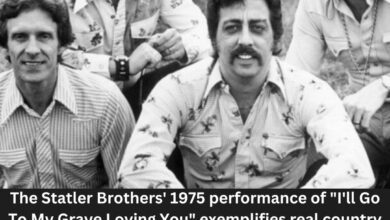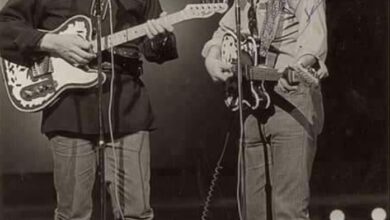Elvis’s Final Performance: A Courageous Effort Despite Clear Health Issues
Elvis Presley, born on January 8, 1935, in Tupelo, Mississippi, is often celebrated as the “King of Rock and Roll.” His journey from a humble beginning to becoming a global music icon is a testament to his extraordinary talent and charisma. Growing up in a working-class family, Presley was exposed to a rich tapestry of musical influences. His early exposure to gospel music in church, along with rhythm and blues from local radio stations, helped shape his eclectic musical style.
He first gained national attention in 1956 with his hit single “Heartbreak Hotel,” which skyrocketed to the top of the charts. The song combined a poignant narrative with a blend of rockabilly, rhythm, and blues, showcasing Presley’s distinctive vocal style. His performances were marked by a lively, energetic presence that captivated audiences, allowing him to break into mainstream music during a time of cultural conservatism. As he became a household name, his physical appearance, especially his looks and signature hairstyle, also contributed to his appeal, making him a teen idol.
Presley’s career was not solely defined by his music but also by his groundbreaking presence on television. His appearances, particularly on shows like “The Ed Sullivan Show,” exposed a broader audience to his performances, bridging gaps between different musical genres and racial divides. His blend of rock and roll with elements of country, blues, and gospel resonated with a diverse audience and played a crucial role in the evolution of contemporary music.
In addition to his music career, Presley ventured into acting, starring in numerous films throughout the late 1950s and the 1960s. While some films were commercially successful, many critics felt that they showcased him in a less-than-favorable light, often relegating him to roles that failed to leverage his musical talents. Despite this, films like “Jailhouse Rock” and “Blue Hawaii” featured memorable soundtracks that contributed to his lasting legacy. However, his passion for live performance would ultimately lead him back to the concert stage, culminating in his famous “68 Comeback Special,” which reestablished him as a powerful live performer.
The 1970s were a challenging time for Elvis. As his career evolved, he faced intensified scrutiny, both in terms of his music and his personal life. The pressures of fame began to take a toll on his mental and physical health. The rise of new musical styles, such as disco and punk rock, coupled with his health struggles, made it more difficult for him to maintain the same level of popularity he once enjoyed. With a demanding tour schedule, his struggles with substance abuse also became more apparent. Behind the scenes, he fought a battle with addiction that would ultimately lead to his tragic and untimely death on August 16, 1977.
Despite the challenges he faced personally, Presley’s musical talent never faltered. Many fans recount that even during his later performances, the power of his voice remained a force to be reckoned with. In his final years, he performed more than 50 shows in 1977 alone, presenting a mix of both scenes of brilliance and struggles. The intensity and authenticity of his performances during this period revealed an artist grappling with his humanity, providing an emotional depth that resonates with fans even now.
Elvis’s life and legacy continue to elicit deep analysis and admiration from fans and scholars alike. Numerous documentaries and biographical accounts delve into the intricacies of his life, portraying both the glamour of his fame and the underlying struggles he faced. The scholarly work surrounding him often emphasizes the duality of his existence—a pop culture phenomenon grappling with profound isolation and the pressures of stardom. These narratives reveal not just an entertainer but a complex individual whose journey is emblematic of the broader struggles faced by many in the spotlight.
The iconic space known as Graceland, his Memphis estate, stands as a pilgrimage site for millions of fans from all corners of the globe. Here, visitors can immerse themselves in the life and legacy of Elvis Presley through exhibits featuring memorabilia, photographs, and more. Each artifact tells a story, contributing to the rich tapestry that is Presley’s life. The annual gatherings, anniversaries, and celebrations hosted at Graceland keep the spirit of Elvis alive, as new generations discover his music and influence.
Elvis’s music continues to inspire artists across genres, with many contemporary musicians citing him as a pivotal influence. His ability to infuse emotion into his songs often transcended the boundaries of genre, allowing his music to resonate with listeners of all backgrounds. Artists from Bruce Springsteen to Lady Gaga have acknowledged their admiration for him, and the Elvis impersonation phenomenon demonstrates just how pervasive his influence is in popular culture.
In popular memory, Presley’s lasting contributions to music and culture are interwoven with themes of resilience, identity, and artistic expression. His life serves as a reminder that while he was a larger-than-life figure on stage, he was also an individual facing the same struggles many encounter. The brilliance of his music allows generations to connect with him, providing an understanding of the human experience through rhythm, melody, and heartfelt lyrics.
Elvis Presley’s legacy endures, a vibrant testament to his impact on music and culture. His story—a harmonious blend of triumphs and trials—reminds us that through music, one can influence hearts and bridge divides. The echoes of his voice continue to resonate, ensuring that the King of Rock and Roll remains a celebrated figure in the annals of music history, capturing the imaginations and hearts of fans around the world.





